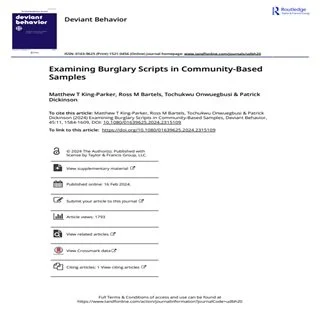By Matthew T King-Parke, Ross M Bartels, Tochukwu Onwuegbusi
Burglary is a high-volume and frequently repeated offense. However, little is known about the cognitive scripts that may facilitate first-time burglaries. Thus, this paper reports three studies that examined burglary scripts within community participants. Study 1 (N = 113) involved developing two versions of a Burglary Script Assessment; one that assesses burglary scripts with different motivations and one that does not stipulate a specific motivation. Despite having never committed a burglary, many participants were found to hold a burglary script containing expert-like knowledge. Also, more detailed scripts were associated with a proclivity to enact the script. Study 2 (N = 44) examined whether the four motivated scripts correlated with a relevant construct (i.e. burglary-specific distortions, sensation-seeking, anger rumination). Burglary scripts motivated by desperation and thrill were correlated with burglary distortions and sensation-seeking, respectively. Using an experimental design, Study 3 (N = 146) showed that engaging in mental imagery about burglary increased script detail, relative to a no imagery group. However, phenomenological characteristics of the imagery and criminal attitudes were unrelated to script scores. Collectively, the findings offer new insights into burglary scripts, offering implications for understanding the risk of committing burglary. Limitations and suggestions for future research are discussed.
Deviant Behavior Volume 45, 2024 - Issue 11



